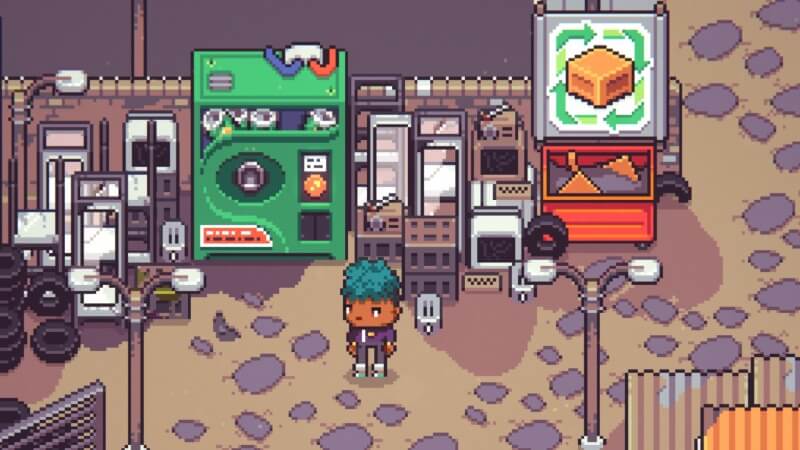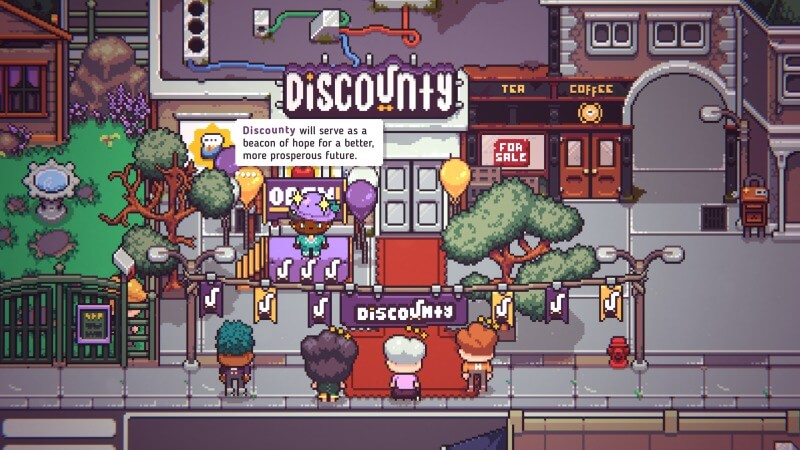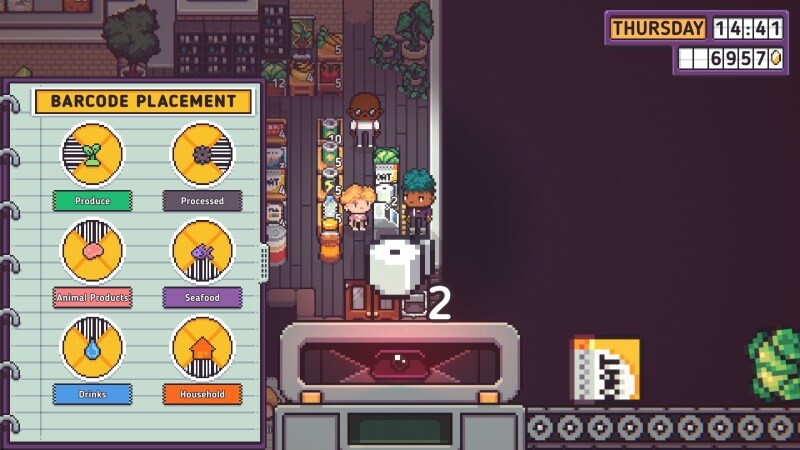Discounty Makes Expanding A Supermarket Fun, Hectic, And Bittersweet

If you’ve ever given a scrap of attention to American politics, then you’ll no doubt have come across some suit or another talking about how we, the people, are failing our small towns. And it’s not an inaccurate statement, given the numerous stories you’ll come across where young people flew from their humble beginnings to find better opportunities elsewhere, or the town’s main industry became irrelevant over time and the area never adapted, or a freak accident scared people away and turned a modest cluster of homes and buildings into fodder for future content creators. After such a story is shared, what often follows is a claim that the area must see big business come in to boost the local economy, often with the intent of encouraging people to stop at a given small town rather than pass it by on the way somewhere else.
Discounty is a game that hosts one such story explicitly, except rather than repeat the above mantra, the supermarket management and social simulator practically screams at the player that big business will not save the town—at least not without some major drawbacks. In this game from developer Crinkle Cut Games, players become the lightly customizable Shopkeeper, who is moving to the small town Blomkest to run his Aunt Tellar’s store. Through a deal with the corporation Discounty, Aunt Tellar has dreams of turning her humble grocery store into another major arm of the megafranchise. In pursuit of this goal, players will traipse around Blomkest making deals with local vendors, getting involved with small-town drama, and running the supermarket every day with expansion in mind.
Time will be spent fairly evenly between managing the supermarket and getting to know Blomkest. As someone who loves inventory management and doing quick math, the former was a treat. Don’t get scared by the word math, though. While Discounty involves a lot of numbers, it’s more about memorizing prices and keeping track of item stock rather than doing actual calculations. There’s an in-game calculator that can save anyone from doing mental gymnastics. Plus, a scanner can be unlocked later through the same small goals-based reward system that allows players to choose new items to stock, and it completely removes any math altogether.
As such, the game ends up more invested in emulating the feel of running an up-and-coming business rather than the nitty gritty logistics. Things are busy, but balanced in such a way in where natural lulls will occur that create breathing room. Thus, it pulls off the trick of showing how much labor goes into running even the smallest venture every day—as the shopkeeper’s duties, outside of helping Blomkest’s residents with their numerous issues, include planning the store floor, manning the register, cleaning any spills, recycling cardboard and styrofoam boxes, ordering and restocking items, and advertising the store with posters around town—while also translating how necessary it is to think about the future if you plan to expand. While the store would close at 5 pm, I was still working well past locking up, ordering more items or rearranging shelves in anticipation of a new product, until I was rushing back home at 11:30 pm to ensure the Shopkeeper didn’t pass out from exhaustion.

The most interesting part of this expansion planning is that it doesn’t feel good. And I don’t mean mechanically, as it was easy to get into a flow state during Discounty’s operating hours. Instead, Discounty makes you feel horrible when expanding because it explicitly puts it in conflict with some long-time residents’ wishes to preserve parts of their town. Without spoiling too much, Blomkest’s folks are not quiet about the damage they feel Discounty’s expansion would do to their home, frequently accusing you and Aunt Tellar of having less than noble desires. I often found myself dreading the next part of Discounty’s story not because I was bored or frustrated with it, but because the game had turned me at multiple instances into the town’s bad guy. I was forced by the story to be on the opposite side of residents I liked, which forced interrogation of my role as a newcomer who promised massive change that ultimately brought little comfort to folks who’d been there all their lives.
Speaking of Blomkest’s residents, while several of them agree on Discounty’s expansion being an issue, they are far from a monolith in both opinions and personalities. Much like the physical town itself, these folks have seen better days, and players will learn about the various ways each resident or frequent visitor is navigating their decline.
-

-

-

-

-

-

-

-

-

-

-

-

-

-

-

-

-

-

-

-

-

-

-

-

-

-

-

-

-

-

-

-

-

-

-

-

-

-

-

-









































